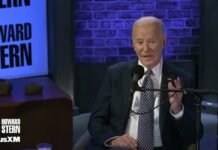Americans trying to retire for the last two years have felt like Charlie Brown ready to kick the football.
They think their nest egg is large enough, but then another round of monthly inflation data shows the cost of living has risen once again.
That’s when President Joe Biden yanks the football away, and would-be retirees realize they can’t stop working yet.
Biden’s economic leadership has been wanting, to put it charitably.
When he took office, the economy was growing at a $1.5 trillion annualized rate and recovering an average of a half- million jobs per month.
Inflation was a mere 1.4%, lower than the Federal Reserve’s 2% target.
Just 18 months later, Biden managed to run up inflation to 40-year highs, with prices rising in a single month about as fast as they increased in the entire year before he took office.
Simultaneously, the economy contracted for two consecutive quarters — what we used to call a recession.
While inflation has come down from that breakneck pace, it is reaccelerating, and economic growth has been anemic.
The labor market is still missing between 4.5 million and 5.5 million workers, leaving employment far below its pre-pandemic trend.
Accounting for all these absent workers yields an unemployment rate that’s more than 6%.
It’s the persistent inflation really hurting those who were hoping to retire.
If you were a prospective retiree, planning to leave work with $1 million in savings and investments, you’ve had to radically adjust that calculus because prices have risen about 17% on average since Biden took office.
That means you need an extra $170,000 in savings to have the same real value in your nest egg.
But that assumes inflation will return to its low, pre-Biden level — which won’t happen any time soon: Government spending, borrowing and money-creating remain elevated.
Higher inflation will eat away retirement savings faster, so you need a larger portfolio to cover your cost of living.
Even in the unlikely scenario government spending comes back down to earth and inflation returns to 2%, the aspiring retiree in our example still needs to come up with at least that extra $170,000.
Otherwise he’ll have to seriously cut back on his quality of life in retirement.
By E. J. Antoni













































